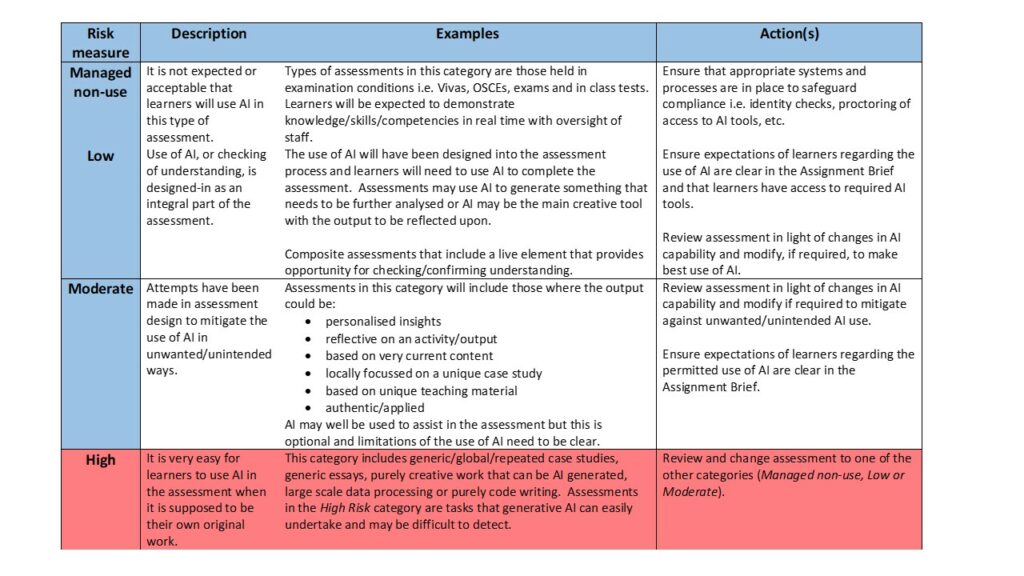The use of AI presents both challenges and opportunities for how it is used in our teaching, learning and assessment practice. All courses are therefore required to review their assessments to identify potential risk for academic misconduct and where such risk is identified to undertake assessment re-design informed by the following principles.
- A course level approach to assessment, adopting authentic tasks that support students to be able to engage with AI in an ethical and active way through the course and beyond.
- The use of AI needs to be incorporated into assessment design in a ‘considered and transparent’ way that develops students’ capabilities and critical analysis of the use of AI.
- The assessment will develop students AI literacies.
- Course teams will ensure students have equitable opportunities to engage with AI.
- A range of inclusive and contextualised assessments are used to ensure the quality of assessment judgements.
- To ensure there is confidence in the academic judgements resulting from assessments across a course there is a need for a range of assessments that allow for triangulation.
- A greater focus on assessing the learning process.
- Identify key assessment points where greater focus is needed on assessment of learning to inform decisions on progression and completion. Making use of the range of assessments available in the University (i.e. course-based)
Timelines
Review to be completed by January 2025, to identify which assessments need to be updated ready for September 2025 delivery.
To support the review process the following AI Risk Measure Framework has been created against which to evaluate assessments, see below:

Additionally, artificial intelligence misuse is not the only threat to the academic integrity of assessments. Other types of threats to the integrity of assessments include:
Collusion: Undisclosed collaboration of two or more people on an assignment or task, which is supposed to be completed individually (Adapted for ENAI Glossary from: McGowan, S. Breaches of academic integrity using collusion. In Bretag, T. (ed.), Handbook of Academic Integrity. Springer, 2016).
Contract cheating: A form of academic misconduct when a person uses an undeclared and/or unauthorised third party to assist them to produce work for academic credit or progression, whether or not payment or other favour is involved (ENAI Glossary).
Data Fabrication: Making up data and using them as if genuine (ENAI Glossary).
Data Falsification: Unjustified manipulation of research data with the intention of giving a misleading impression. (Adapted for ENAI Glossary from Springer. Publishing Ethics for journals: A guide for Editors-in-Chief, Associate Editors, and Managing Editors, 2013).
Ghost-writing: Type of consultancy service when a company or an individual provides bespoke work to a person to present as their own work (ENAI Glossary).
Plagiarism: Presenting work/ideas taken from other sources without proper acknowledgment. (Adapted for ENAI Glossary from: Meuschke, N., & Gipp, B. (2013). State-of-the-art in detecting academic plagiarism. International Journal for Educational Integrity, 9(1): 50-57).
Self-plagiarism: Where students re-use or re-present their own work without acknowledging the original submission, in a situation where original individual work is required (Coventry University Group definition).
Where there are other serious opportunities from these academic integrity threats, the assessments would be categorised as “High Risk”. Bearing in mind both the Risk Measure Framework and the other academic integrity threats any assessments adjudged to be “High Risk” should be redesigned to align with one of the other categories; “Managed non-use, Low or Moderate”. The redesign of assessments, at module level, should be undertaken with consideration for the balance and variety of assessments that students will undertake at course level.
